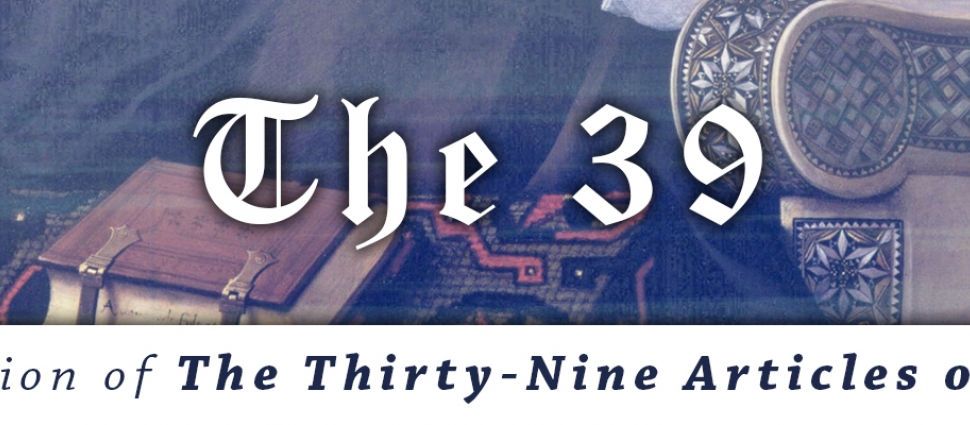39 Articles—The Rule of Faith (3)

Jun 2, 2017
We first mentioned Article 8 of the Thirty-Nine Articles of Religion in our discussion of Article 2. We saw how the articles as a narrative whole link Article 8 and Article 2 on understanding the person of the Lord Jesus Christ. But we can also see how Article 8 concludes the triad of the Anglican rule of faith in a clear statement that the three central creeds of Anglicanism are the hallmarks of an authentic Christian faith because they summarize the doctrines of the Scripture.
VIII — Of the Three CreedsThe Three creeds, Nicene Creed, Athanasius’s Creed, and that which is commonly called the Apostles’ Creed, ought thoroughly to be received and believed: for they may be proved by most certain warrants of holy Scripture.
Article 8 is only slightly altered from the 1553 original by Thomas Cranmer. Archbishop Parker strengthens the quality of their reception in adding the phrase, "…and believed" after the clause, "ought thoroughly to be received." The Anglican divines understood that these three creeds were universally agreed across the Church, both east and west. They summarize the core doctrines of the catholic church. However, they also knew that merely having a creed is no guarantee that a church will be free from error. Creeds are not inspired, they are composed by sinful men (as Article 21 explains). Therefore, they must be subject to Scripture. The wording of the revision is important. The Latin original has the adverb omnino, “thoroughly,” “utterly,” “entirely." There is no room for disagreeing or even of taking exception at any point of the three creeds here. Grounded in sola scriptura, Anglicans are to uphold the three creeds ex animo in each and every clause they contain because "they may be proved by most certain warrants of holy Scripture."
When we search the historical formularies, we find that the 1662 Book of Common Prayer requires Anglicans to recite the Apostles Creed every day in Morning and Evening Prayer, and the Nicene Creed follows the reading of the Scriptures in the service of Holy Communion. Athanasius' Creed is required instead of the Apostles Creed on fourteen days during the Christian year that includes the five major gospel days of Christmas Day, Easter Day, Ascension Day, Pentecost, and Trinity Sunday. However, problems arise when creeds or confessions like the Thirty-nine Articles, are ignored or reinterpreted. The rise of the parish communion movement in the 1960’s Episcopal Church and the displacement of Sunday worship by an increasingly secular society has brought about the loss of public services of morning and evening prayer for one service of Holy Communion in our Anglican churches. When we add those who have come from evangelical churches that have minimalist “statements of faith” that function like the creeds but are poorly or carelessly written, we can start to see how of the three creeds the Apostles and Athanasian became irrelevant to North American Anglicans.
Thus, far from being a measure of biblical faithfulness as they were intended, they are seldom heard or taught, leading to even deeper divisions within Anglicanism on this continent. A sobering fact, especially in light of the opening and closing words of the Athanasian Creed: "Whosoever will be saved must above all things hold the catholic faith, which except a man do believe wholly and undefiled, he shall perish everlastingly!" Why would the Athanasian Creed make such a claim? It is because our faith demands knowledge of the doctrines of the gospel, an active assent, and a continual trust in our Savior described in these biblical truths. The act of knowing, consenting, and trusting to the biblical beliefs of the Church is necessary for salvation. This is more than a recitation of the creeds, but certainly not less than this! The creeds are not just a quiz. They are a point-by-point summary of how you are saved. We need to hear them every week, if not every day.
Consider the solidarity in fellowship that the three creeds provide for Christians today. In countries where Christianity is a minority religion or restricted by the government and culture, to recite the creeds, and the biblical affirmations they share is a witness and sign of protest. It is one of the most counter-cultural things they, or any Christian, can do. There are a gradual narrowing and clarity in the creeds that separate the biblical gospel from other religions of the world. The creeds give us specificity.
It is indeed a sad state of affairs when the revival of North American Anglicanism is defined more by our political views: "Oh, you’re the ones against gay clergy and gay marriage." Never once being pulled back as being biblically faithful, apostolically historical, and profoundly Trinitarian because we confess and affirm ("I believe") the three creeds of Christendom. They are our pledge of allegiance. All three coming as they do in the structure of the liturgy of the Book of Common Prayer after our confession of sin and hearing the refreshing good news of the gospel in the reading of the Scriptures and the singing of psalms, the three creeds bring us to the adoration of the Father, the Son, and the Holy Spirit.
For previous articles in this series, see:





